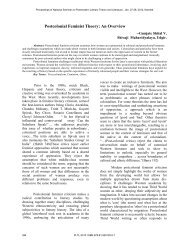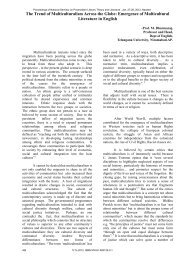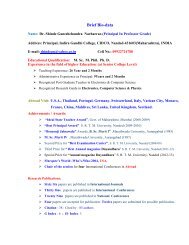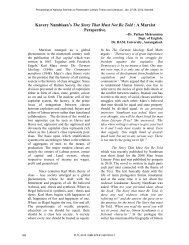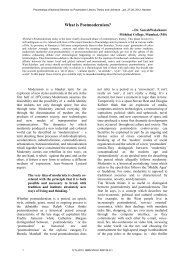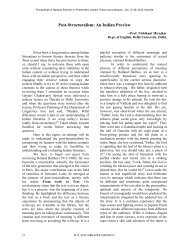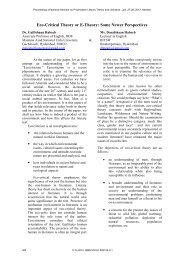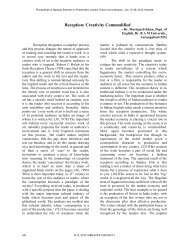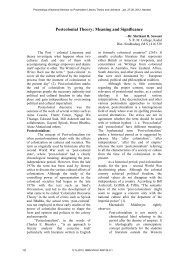Proceedings of National Seminar on Postmodern ... - Igcollege.org
Proceedings of National Seminar on Postmodern ... - Igcollege.org
Proceedings of National Seminar on Postmodern ... - Igcollege.org
Create successful ePaper yourself
Turn your PDF publications into a flip-book with our unique Google optimized e-Paper software.
<str<strong>on</strong>g>Proceedings</str<strong>on</strong>g> <str<strong>on</strong>g>of</str<strong>on</strong>g> <str<strong>on</strong>g>Nati<strong>on</strong>al</str<strong>on</strong>g> <str<strong>on</strong>g>Seminar</str<strong>on</strong>g> <strong>on</strong> <strong>Postmodern</strong> Literary Theory and Literature , Jan. 27-28, 2012, Nanded<br />
Adumbrati<strong>on</strong> <str<strong>on</strong>g>of</str<strong>on</strong>g> Major C<strong>on</strong>cepts in Film Theory<br />
--Sushil A. Deshmukh,<br />
Tuljaram Chaturchand College,<br />
Baramati Dist- Pune, 413102.<br />
Cinema has arguably been the most<br />
powerful cultural phenomen<strong>on</strong> <str<strong>on</strong>g>of</str<strong>on</strong>g> the twentieth<br />
century. As a mode <str<strong>on</strong>g>of</str<strong>on</strong>g> mass public culture, art<br />
practice, vehicle <str<strong>on</strong>g>of</str<strong>on</strong>g> propaganda and<br />
documentary reflecti<strong>on</strong>, it has been integral to<br />
the development <str<strong>on</strong>g>of</str<strong>on</strong>g> modern societies. Film<br />
theory is an academic discipline which intends<br />
to explore the essence <str<strong>on</strong>g>of</str<strong>on</strong>g> the Cinema and<br />
provides ideas and principles based frame works<br />
to understand film’s relati<strong>on</strong>ship to reality, the<br />
other arts, individual viewers and society at<br />
large. Living in a multi-centered media world,<br />
academia has begun to draw up<strong>on</strong> from an<br />
elective range <str<strong>on</strong>g>of</str<strong>on</strong>g> disciplinary approaches- media<br />
and cultural studies, anthropology, sociology,<br />
film and performance studies and more, to<br />
accommodate perspectives and research<br />
methods from both the humanities and social<br />
sciences.<br />
Literature, media and films are means <str<strong>on</strong>g>of</str<strong>on</strong>g><br />
communicati<strong>on</strong> and these have had an enormous<br />
influence <strong>on</strong> every single <strong>on</strong>e <str<strong>on</strong>g>of</str<strong>on</strong>g> us. Film theory<br />
is a verbal representati<strong>on</strong> <str<strong>on</strong>g>of</str<strong>on</strong>g> the film complex.<br />
However, Film Theory is not to be c<strong>on</strong>fused<br />
with general film criticism, though there can be<br />
some crossover between the two disciplines.<br />
One <str<strong>on</strong>g>of</str<strong>on</strong>g> the notable predecessors <str<strong>on</strong>g>of</str<strong>on</strong>g> the<br />
development <str<strong>on</strong>g>of</str<strong>on</strong>g> ‘Film Theory’ is the French<br />
philosopher Henri Bergs<strong>on</strong>. His work “Matter<br />
and Memory” (1896) had wide influence ‘during<br />
the birth <str<strong>on</strong>g>of</str<strong>on</strong>g> cinema. Bergs<strong>on</strong> coined the terms<br />
“the movement image” and “the time image.”<br />
Early Film-Theory arose in the silent<br />
era and was mostly c<strong>on</strong>cerned with defining the<br />
crucial elements <str<strong>on</strong>g>of</str<strong>on</strong>g> cinema as a medium. It<br />
largely evolved from the works <str<strong>on</strong>g>of</str<strong>on</strong>g> directors like<br />
Germaine Dulac, Louis Dellue, Jean Epstein,<br />
Sergei Eisenstain, Lev Kuleshov, and Dziga<br />
Vertov and film theorists like Rudolf Arnheim<br />
and Bela Balazs. These individuals emphasized<br />
how film differed from reality and how it might<br />
be c<strong>on</strong>sidered a valid art form. However, the<br />
French critic Andre Bazin voiced against this<br />
approach. He argued that film’s essence lay in<br />
its ability to mechanically reproduce reality, not<br />
in its difference from reality. American scholar<br />
David Bordwell has used the humorously<br />
derogatory term “SLAB theory” to refer to film<br />
studies based <strong>on</strong> the ideas <str<strong>on</strong>g>of</str<strong>on</strong>g> Saussure, Lacan,<br />
Althusser and Barthes. Film always exceeds<br />
attempts to institute such New- Critical readings,<br />
because <str<strong>on</strong>g>of</str<strong>on</strong>g> its history. Film’s promiscuity points<br />
every day and in every way toward the social. It<br />
is three things, all at <strong>on</strong>ce: a recorder <str<strong>on</strong>g>of</str<strong>on</strong>g> reality; a<br />
manufacturer <str<strong>on</strong>g>of</str<strong>on</strong>g> reality and part <str<strong>on</strong>g>of</str<strong>on</strong>g> reality.Film<br />
is a marker <str<strong>on</strong>g>of</str<strong>on</strong>g> culture:<br />
………………….not even the final<br />
target <str<strong>on</strong>g>of</str<strong>on</strong>g> enquiry, but part <str<strong>on</strong>g>of</str<strong>on</strong>g> a wider<br />
argument about representati<strong>on</strong>s-- the<br />
social process <str<strong>on</strong>g>of</str<strong>on</strong>g> making images,<br />
sounds, signs stand for<br />
something………….In effect, Film<br />
Theory becomes part <str<strong>on</strong>g>of</str<strong>on</strong>g> the wider field<br />
<str<strong>on</strong>g>of</str<strong>on</strong>g> disciplines and approaches called<br />
cultural studies (Turner 1988:38).<br />
This suggests that the study <str<strong>on</strong>g>of</str<strong>on</strong>g> cinema is about<br />
how c<strong>on</strong>sciousness and systems <str<strong>on</strong>g>of</str<strong>on</strong>g> value are<br />
created and either bind society together or<br />
illuminate its fissures. Film attained its majority<br />
as <strong>on</strong>e <str<strong>on</strong>g>of</str<strong>on</strong>g> the principal new forms <str<strong>on</strong>g>of</str<strong>on</strong>g> inter-war<br />
communicati<strong>on</strong>. Al<strong>on</strong>g with the popular press<br />
and radio, it was designated as ideal for<br />
propaganda and social uplift.<br />
Specific Theories <str<strong>on</strong>g>of</str<strong>on</strong>g> Film:<br />
Apparatus theory – Apparatus theory came into<br />
prominence in 1970s. The term 'cinematic<br />
apparatus' refers to both an industrial machine as<br />
well as a mental or psychic apparatus. Jean<br />
Louis Baudry and Metz and Mulvey analyze the<br />
cinema as an institutui<strong>on</strong>. Baudry explored his<br />
ideas about the cinematic apparatus in his essay<br />
‘ Ideological Effects <str<strong>on</strong>g>of</str<strong>on</strong>g> the Basic<br />
Cinematographic Apparatus’. He maintains that<br />
cinema is by nature ideological because its<br />
mechanics <str<strong>on</strong>g>of</str<strong>on</strong>g> representati<strong>on</strong> are ideological. Its<br />
mechanics <str<strong>on</strong>g>of</str<strong>on</strong>g> representati<strong>on</strong> include the camera<br />
and editing. The central positi<strong>on</strong> <str<strong>on</strong>g>of</str<strong>on</strong>g> the spectator<br />
within the perspective <str<strong>on</strong>g>of</str<strong>on</strong>g> the compositi<strong>on</strong> is also<br />
ideological. Apparatus theory argues that cinema<br />
525 PLTL-2012: ISBN 978-81-920120-0-1



